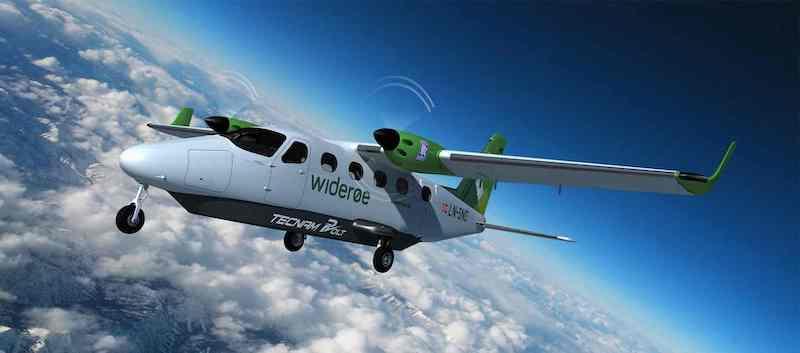
SAN DIEGO—Italy-based Tecnam Aircraft has suspended plans to develop the P-Volt all-electric version of the company’s P2012 twin-engine light regional aircraft after concluding that near-term battery technology is not sufficiently mature.
The P-Volt was under evaluation by Norwegian regional airline Widerøe as well as Rolls-Royce, which planned to replace the P2012’s two 275-kW (370 hp) Lycoming piston engines with 320-kW electric motors. The study, which was announced in March 2021, aimed at enabling “first-generation battery electric flight for the Norwegian market.”
Tecnam says, “The time for P-Volt is not yet ripe, although research activities will continue to explore new emerging technologies.” Having aimed to develop a profitable all-electric passenger aircraft, the company now “believes that these can only be achieved by extremely aggressive speculation on uncertain technology developments.”
One of the study’s conclusions was that an aircraft with a battery pack “at the end of its life would not be the best product for the market, but certainly the worst in terms of net present value.” Tecnam says the “proliferation of aircraft with ‘new’ batteries would lead to unrealistic mission profiles that would quickly degrade after a few weeks of operation.”
The company’s analysis indicated that even with the most optimistic projections of slow charge cycles and the possible limitation of the maximum charge level per cycle, “the real storage capacity would fall below 170Wh/kg, and only a few hundred flights would drive operators to replace the entire storage unit, with a dramatic increase in direct operating costs due to the reserves for battery replacement prices.”
Rolls-Royce, which also planned to provide the battery system, says the available technology could have given the P-Volt a range of around 100 nm in total, enabling operations on routes up to 50 nm. However, the engine-maker acknowledges that “while the initial range is sufficient for key applications, energy storage lifecycle performance results in business cases which do not lend themselves to broad market adoption.”
Rolls says the study result also underscores the emphasis it has placed on hybrid system technology, “with the development of our own turbogenerator capable to run on Sustainable Aviation Fuels as well as collaborations on fuel cell technology for aviation.”
Meanwhile, Rolls says work will continue on the development of better cell technology to “improve the field of viability for all battery commuter platforms,” adding that its “product development for commuter propulsion systems is continuing to power both these and hybrid-electric systems.”
Rolls says it is also continuing its investment in all-battery propulsion systems aimed at the urban air mobility market “where commercially viable operations based upon today’s energy storage solutions are seen.”
Andreas Aks, CEO of Widerøe Zero—the project established to explore zero-emissions projects like the P-Volt—told the American Institute of Aeronautics and Astronautics Aviation forum in San Diego that the airline is now focusing on hybrid-electric and hydrogen-based solutions for its future sustainability strategy.
“We believe strongly in hydrogen and hydrogen-electric, which could be used on some of our missions,” Aks says. Some 74% of Widerøe’s flights are on routes shorter than 300 km (186 mi.) and are often only 15 to 25 min. in duration.

Comments